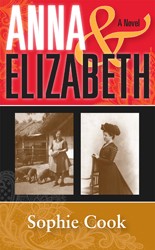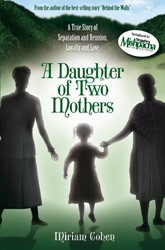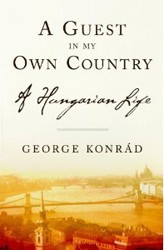Sophie Cook’s family history and childhood experience of surviving the Holocaust in Hungary inform her first historical novel, Anna & Elizabeth. Sophie is guest blogging for Jewish Book Council all week as part of the Visiting Scribe series on The ProsenPeople.
My historical novel Anna & Elizabeth was born late one afternoon, when I was a teenager. I was sitting in our living room in New York City, surrounded by family furniture my mother had rescued from our family’s Holocaust persecution in Budapest, Hungary. The furniture, like my immediate family, was a survivor from a shipwreck. But like my family, the chests and armoires I was looking at had been lovingly restored and full of stories.
In March of 1944, when the deportations started, we had to leave our apartment as Jews to go into hiding. I was six years old. My brother and I were separated from our parents until February 1945, when Russian troops liberated Budapest. We were finally reunited with my mother and father, both of whom had miraculously survived; late in 1944, Hungarian Nazi thugs had murdered my beloved grandmother and my great-aunt. Because the two old women had been shot and thrown into the icy Danube, my mother would never again go near the river.
It is amazing how much loving parents can do to heal a child’s tragedy. Living in a rented apartment while my parents prepared to leave a country that had betrayed them, I could be a child again. My brother and I played with the colored shards of a stained glass window, shattered by the bombing; eating the home-baked bread my mother made for my father’s workers was an exciting treat. (With rampant post-war inflation, workers at my father’s stove factory wanted to be paid in kind.) My mother, my brother, and I left Hungary in early 1947, and my father followed us shortly afterwards, before the Iron Curtain would have cut us off and nationalized his factory. After long delays spent as refugees in Western Europe, we happily reached New York in 1951, when I was 14 years old.
 I still don’t know how my mother managed to repair and ship the Biedermeier family furniture that she insisted on bringing to New York, but I was proud that our shabby railroad flat in the Hungarian neighborhood of Manhattan, for which we paid $185 per month, was beautifully furnished. I also knew that my mother had gone to so much trouble because these heirlooms represented for her the cultured, tolerant world of her youth, swept away by the war and the Holocaust. My children and I now share this furniture and the memories that go with them.
I still don’t know how my mother managed to repair and ship the Biedermeier family furniture that she insisted on bringing to New York, but I was proud that our shabby railroad flat in the Hungarian neighborhood of Manhattan, for which we paid $185 per month, was beautifully furnished. I also knew that my mother had gone to so much trouble because these heirlooms represented for her the cultured, tolerant world of her youth, swept away by the war and the Holocaust. My children and I now share this furniture and the memories that go with them.
In high school, I took a class in creative writing. One late afternoon, sitting alone in our apartment, the furniture started to speak to me. My ancestors’ furniture is from the early part of the nineteenth century, before the dark and heavy Victorian styles took over. The pieces are smaller, the fruitwood that was used lighter, and veneer on the surfaces glows with the same kind of gentle shine as the polish used for violins. As I sat in the dusk, I had a vision of large, cheerful families that lived among the furniture, of girls with long braids having piano lessons, of women enjoying long afternoon coffees with cake and whipped cream.
At that time, my understanding of our family’s past was sentimental and incomplete. It took many years for a high school essay to grow into the historical novel of Anna & Elizabeth—by which time I knew much more about my background and Hungary’s history. As a novelist, I also wanted to create compelling characters and settings. But my early attempt drew upon a story and feelings lodged deep in my consciousness.
Novels should be absorbing, entertaining, funny, and sad, as I hope mine is. If they come from the heart, they reach the hearts of their readers, regardless of their own background. As I continue to write, I aim at plumbing my own depths in order to do so.
Sophie Cook was born in Hungary. Her family survived the Holocaust and came to the United States in 1951. Before her retirement this year, Sophie worked as an attorney for federal agencies, a mediator, and a manager for non-profit organizations.
Related Content:
- Jerome Charyn: The Land of the Aardvark
- Assaf Gavron: New York, 1998: Research for Moving
- Michael Wex: Old and Grey and Only in the Way
Sophie Cook was born in Hungary. Her family survived the Holocaust and came to the United States in 1951. She is a graduate of Radcliffe College, Columbia Law School, and Johns Hopkins University. Before her retirement this year, Sophie worked as an attorney for federal agencies, a mediator, and a manager for non-profit organizations. Anna & Elizabeth is her first novel.




